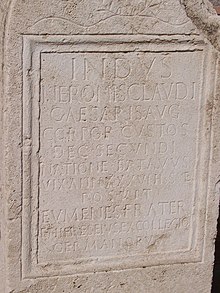
Back Germanische Leibwache German Guardia imperial germana Spanish Germaani ihukaitsjad Estonian Gardes germains French Germani corporis custodes Italian Germani corporis custodes Russian
 |
|---|
| Periods |
|
| Constitution |
| Political institutions |
| Assemblies |
| Ordinary magistrates |
| Extraordinary magistrates |
| Public law |
| Senatus consultum ultimum |
| Titles and honours |
 |
| Part of a series on the |
| Military of ancient Rome |
|---|
|
|

The Numerus Batavorum,[2] also called the cohors Germanorum,[3] Germani corporis custodes,[4] Germani corpore custodes,[5] Imperial German Bodyguard[6] or Germanic bodyguard[7] was a personal, imperial guards unit for the Roman emperors of the Julio-Claudian dynasty (30 BC – AD 68) composed of Germanic soldiers. Although the Praetorians may be considered the Roman emperor's main bodyguard, the Germanic bodyguards were a unit of more personal guards recruited from distant parts of the Empire, so they had no political or personal connections with Rome or the provinces.[8]
From Commentarii de Bello Gallico, it is known that Julius Caesar also had a Germanic bodyguard.[9][10]
- ^ National Museum of Rome, Baths of Diocletian, Rome. Inscription: AE 1952, 148: Indus / Neronis Claudi / Caesaris Aug(usti) / corpor(is) custos / dec(uria) Secundi / natione Batavus / vix(it) ann(os) XXXVI h(ic) s(itus) e(st) / posuit / Eumenes frater / et heres eius ex collegio / Germanorum "Indus, bodyguard of Nero Claudius Caesar Augustus, of the Second Decuria, of the Batavian nation, [who] lived 36 years, is buried here. [The gravestone] was erected by his brother and heir, Eumenes, from the collegium of the Germanic tribesmen".
- ^ Suetonius, Caligula 43.
- ^ Suetonius, Galba 12.
- ^ Suetonius, Caligula 58, 3 and inscriptions, e. g. AE 1952, 148.
- ^ CIL VI 4340, 4342, 4343, 4437, 21068; AE (1976) 750, (1923) 73
- ^ Rankov 1994, p. 5.
- ^ Grünewald & Schalles 2001, p. 97.
- ^ Webster, Graham (1985). The Roman Imperial Army of the First and Second Centuries A.D., Black, London/Oklahoma, p. 101. ISBN 0-8061-3000-8.
- ^ Caesar, de bello Gallico 7, 13, 1.
- ^ Roymans, Nico (2000). Germania inferior (ed. Newald and Schalles), Walter de Gruyter, Berlin. ISBN 3-11-016969-X. p. 97(in English)
© MMXXIII Rich X Search. We shall prevail. All rights reserved. Rich X Search